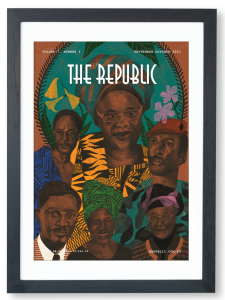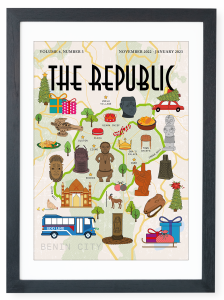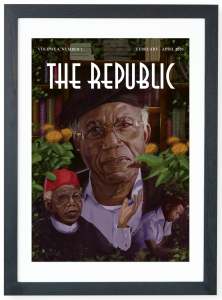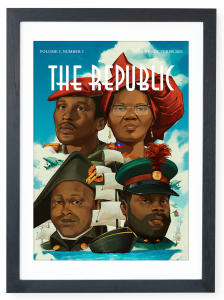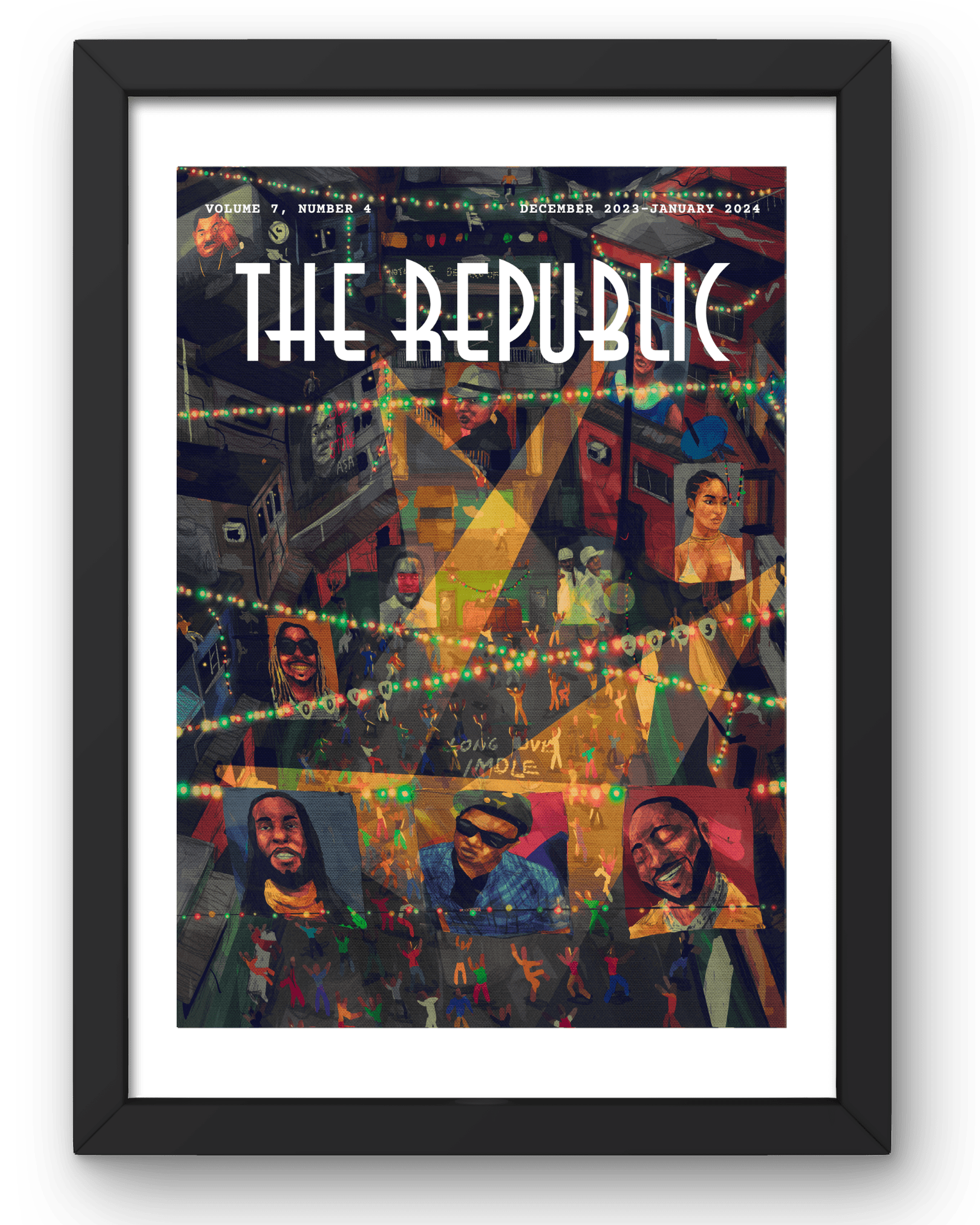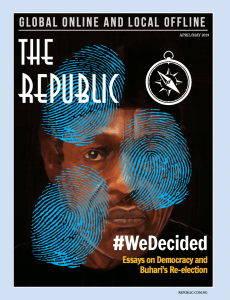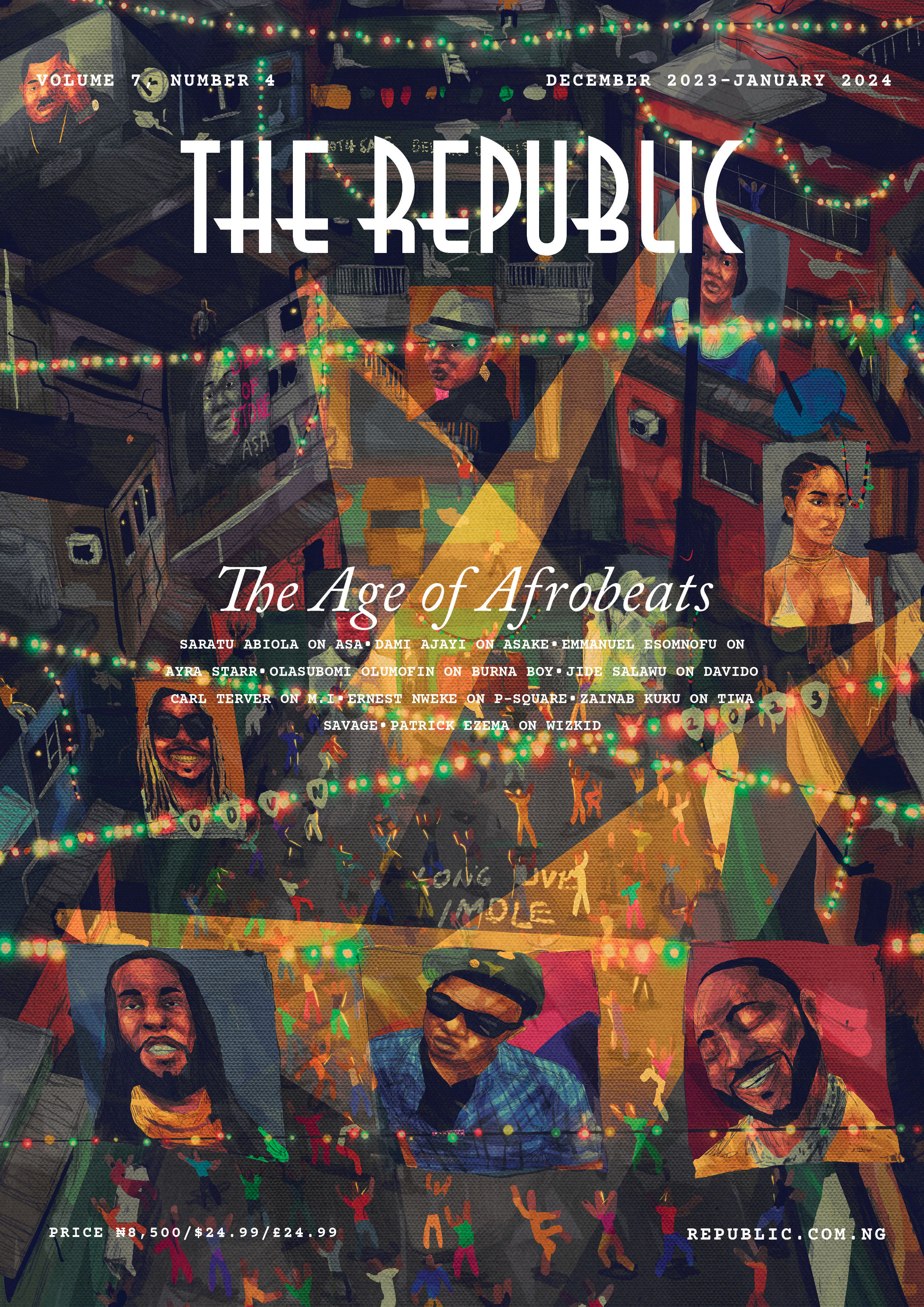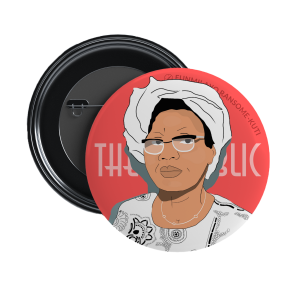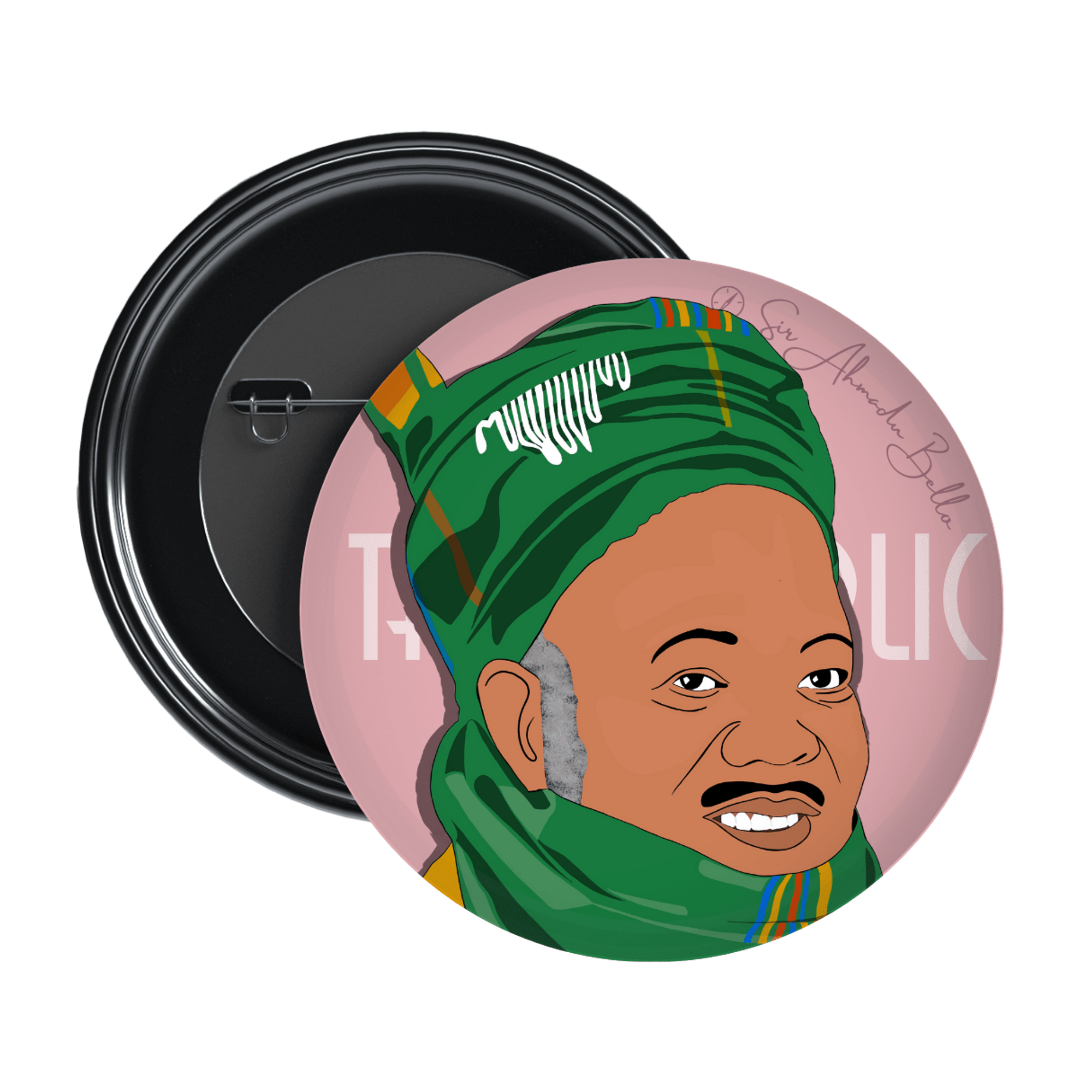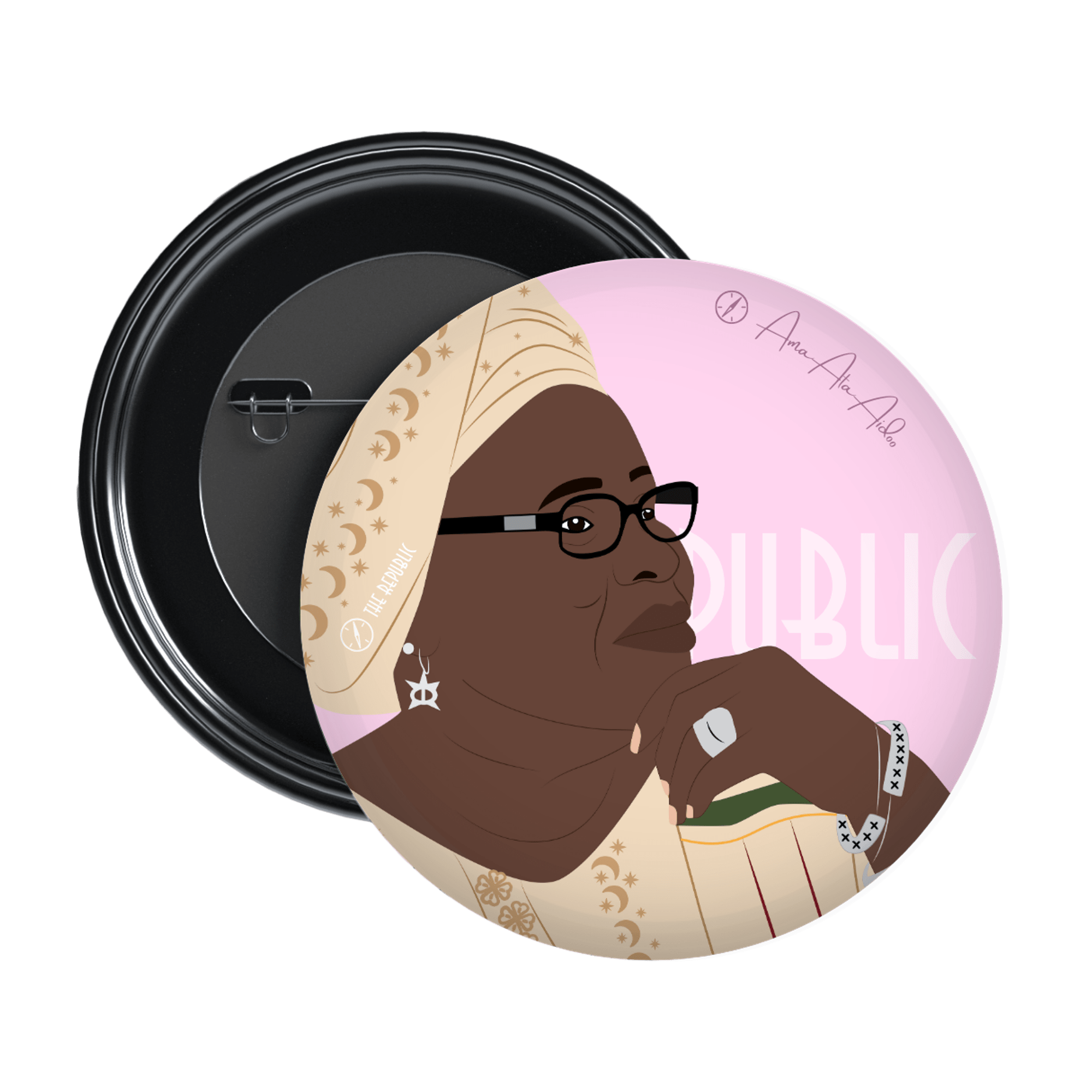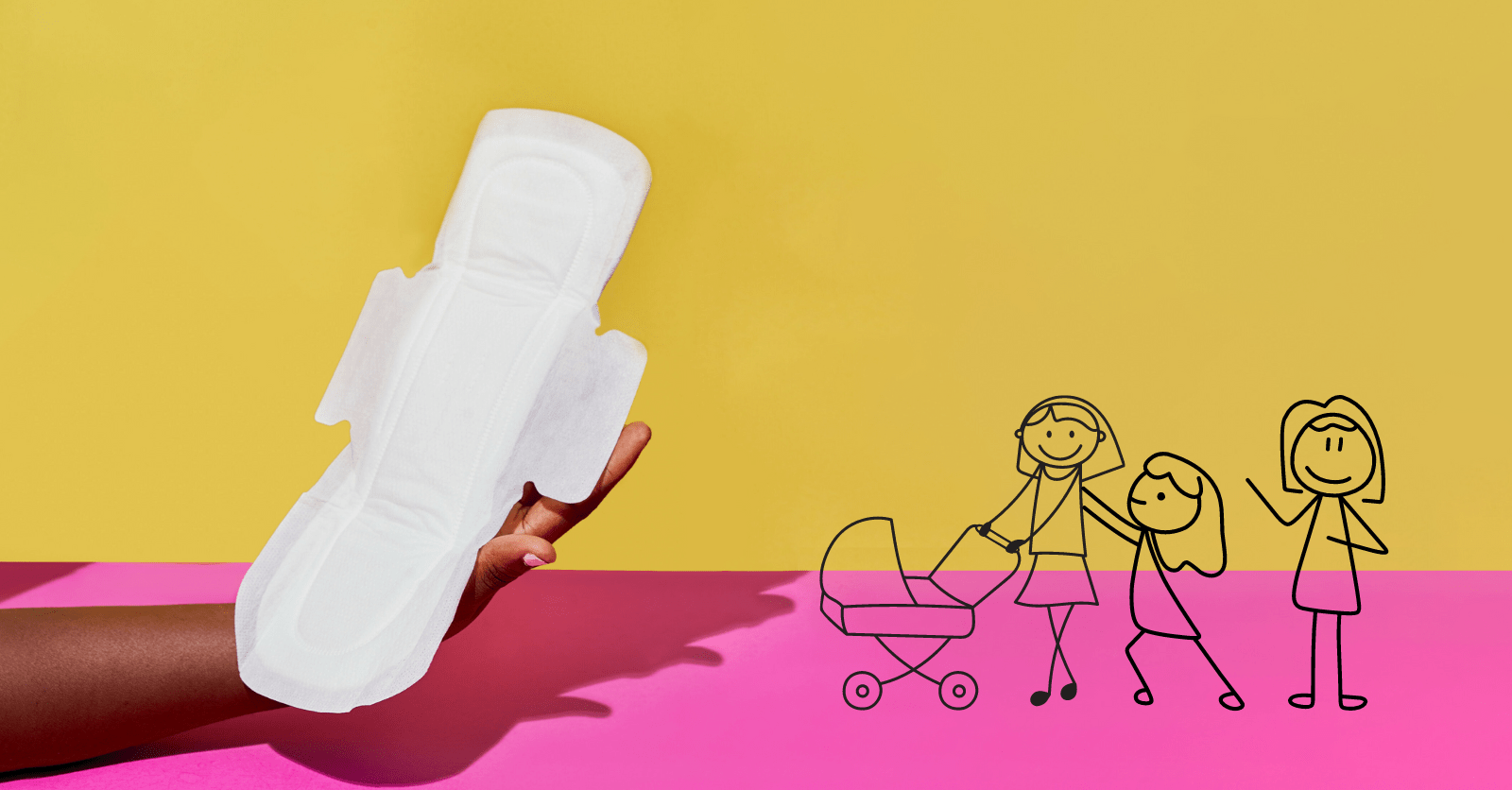
Aya Care’s Comfy Pad. Photo: Aya Care NG. THE REPUBLIC.
the ministry of SCIENCE
Aya Care’s Sudden Fame

Aya Care’s Comfy Pad. Photo: Aya Care NG. THE REPUBLIC.
the ministry of SCIENCE
Aya Care’s Sudden Fame
It was January 2024 in Lagos, Nigeria, and TikTok creator, Tamara, had just gotten an idea for a new TikTok series—she would test and review sanitary pads for research and educational purposes. She had previously heard about Aya Care pads, a relatively new local brand, so she decided to give them a try. When she was sure she loved the feel as much as she loved the look—packaged in a yellow and purple cardboard box with an artwork of a Black woman—she shared a quick video. Tamara could never have anticipated the video’s reach. A friend notified her that the video had gone viral; she had created a trending topic on X (formerly Twitter). The site was on fire with Aya as a buzzword. Just like Tamara, many users thought the pad’s length, thinness and wings were revolutionary finds in the Nigerian sanitary pad market. Suddenly, there was a top dog, and everyone wanted their hands on Aya Care’s pads.
Aya Care is the brainchild of Canadian entrepreneur, Adriana Lica, and Nigerian businesswoman, Inya Ajanaku. It was founded in 2020 from a conversation the two shared on period health in Nigeria. Ajanaku lamented about the lack of affordability for sanitary products and Lica was concerned about the quality of the products on the market. The latter explained that there was a ‘huge gap in quality’ in the Nigerian period market, so the brand was ‘built out of a personal need’.
Aya Care began operations in 2022 and officially launched in July 2023, distributing to different stores and supermarkets. It brands itself as making ‘confident and comfortable period products that care’. This tagline influenced the making of their pads which are thinner and longer than other pads with wings that keep the pad in place.
So far, Aya Care has made a user-friendly product, filling a gap in feminine hygiene products. As of 2022, according to the Sanitation & Hygiene Fund, Nigeria’s menstrual hygiene market was valued at around $371 million (N459 billion at the official rate as of writing), with sanitary pads alone accounting for nearly $369 million (N456.8 billion); but with the menstrual hygiene market in Nigeria constrained by low consumer spending, limited access to products and continuous stigma, how far can Aya Care really go?
COMMUNITY OVER VIRALITY
Regardless of her viral endorsement, Tamara strongly believes that a product will speak for itself if it’s good enough. She knows she helped start the conversation but is also aware that the conversation would have been a dead-end if people tried Aya Care products and realized that they didn’t like it. What use is virality without identifiable strengths for the average user?
The length of Aya Care pads was the brand’s selling point, and once Tamara’s video went viral, Aya Care was quickly branded as a company that listens to and understands its market. However, listening to the market is not as easy as it would seem. This explains why when other brands reached out to Tamara asking for sponsored endorsements, she turned them down. She didn’t like their products and wasn’t going to be a sellout. ‘They wanted to jump on the bandwagon. But their pad didn’t even live up to that standard,’ Tamara told me in an interview. What she did with Aya Care was authentic. She liked the product and wanted to share. Luckily, it paid off.
While there are some concerns about the safety of sanitary pads, pads are generally not harmful. The concern surrounding their safety stems from the vulnerability of the vagina. For instance, taking hormone treatments vaginally allows the drug to be transferred directly into the bloodstream without being metabolized the way it would if taken orally. Furthermore, some ingredients used in making pads are better than others. Most conventional pads are not made entirely of cotton, and often contain synthetic materials like rayon and polyester, which may undergo processing and bleaching with chlorine. Additionally, to absorb menstrual blood, pads commonly use superabsorbent polymers, such as sodium polyacrylate, which are not biodegradable.
Tests for menstrual health products usually involve evaluating factors like absorbency, leakage prevention, and overall performance. Typically, manufacturers use synthetic fluids that mimic menstrual blood such as saline for testing purposes. It was only in 2023 that researchers at Oregon Health and Science University tested the absorbency of various products with real blood to ensure their effectiveness.
More than this, however, individual allergies play an important part in product compatibility. According to Darlene Sandra Clarke-okah, the founder of the menstrual health initiative, Femme Avenue, some individuals may experience skin irritation or allergies to certain materials used in making pads. Tamara had previously experienced such discomfort when using another sanitary pad brand. ‘There was a time [Always] gave me rashes, but I think it was just a factory error. I don’t think all their pads are like that,’ she said. Some ingredients that can cause this irritation are fragrances, synthetic materials, or dye.
Aya Care currently offers two products—medium comfy pads and large comfy pads. According to Lica, they’re ‘the best on the market’. While the co-founder refrained from sharing extensive details about the materials Aya Care uses in producing its pads (presumably to protect the brands competitive advantage), she seemed confident that Aya Care has created the best product with the best ingredients not just in Nigeria, but internationally. She owes this to them spending ‘close to a year designing the perfect pad’. Lica also told me that she was shocked at the state of menstrual health in Nigeria when she surveyed the industry before officially launching Aya Care. ‘The fact that girls need to question the quality [of the period products] is beyond me.’ At the time, she thought to herself, ‘More needs to be done’. Compared to other brands which can cost somewhere around N550 to N1,800, Aya Care pads currently retail at N650, which Lica explains is affordable for the quality produced.
Lica also believes that apart from its design, Aya Care is at a competitive advantage because it is a women-led and women-focused brand. She added that her team of women are setting the standards in an industry that is, so far, primarily led by men who simply cannot relate to the issue they’re attempting to solve.
While Aya Care pads have been flying off the shelves, Lica explains that it wasn’t an easy process to get registered with the National Agency for Food Drug Administration and Control (NAFDAC). According to Lica, healthcare regulations in Nigeria involve thorough work and diligence. However, she believes ‘this is the type of diligence that should be expected for healthcare products.’
Before their debut in the Nigerian market, Aya Care had its pads tested by a group of 30 women (aged 16-40). Most of these women were brought in by the co-founder, Ajanaku, from her church, where she’s a prominent member. Lica told me that with contributions from investors, and a large chunk of their personal money, Ajanaku and Lica flew in a renowned gynaecologist (name withheld) from the US to moderate the session. While moderating, the gynaecologist ensured that the materials used in making the pads were safe and made sure the volunteers understood the process every step of the way. The insights from this test were what inspired the design of Aya pads.
The test was also part of the process for their NAFDAC registration as they needed confirmation from the governing body before initiating the session. While she felt the registration was straightforward, owing to the credibility of the products they presented, Lica added that the process was compounded by the COVID-19 pandemic restrictions. They also had to wait further to obtain the physical document after the pads were already approved for distribution.
shop the republic
ON PRIORITIZING WOMEN
Pads are now the most popular and widely used sanitary product, but before they caught on, women used different materials to manage their periods such as bandages and cloth. Eventually, concerns about bacteria growth caused by inadequate cleaning of reusable products inspired the making of disposable pads and menstrual cups. Despite the dynamic nature of menstrual products, however, the societal stigma associated with menstruation remains constant. For instance, in the 1870s, before they were advertised in catalogues, sanitary products were only marketed door-to-door. The next breakthrough happened during World War I when nurses noticed how well cellulose absorbed blood. As a result, brand such as US-based Kotex began selling cellulose napkins in the early 1900s. Such providers also encouraged women to use these products to join the workforce so they could provide for the home while their spouses were fighting in the war.
A century later, some of these ideas remain. Society expects women to ‘toughen up’ while providing limited options and access to menstrual care. Additionally, menstruation remains a sensitive topic that is often shamed and avoided.
At 13, Clarke-okah was already all too familiar with this concept. She recalls passing in and out of consciousness from period cramps. She remembers feeling odd and hateful that her sisters and friends did not experience their period the same way she did. She remembers having to visit the hospital so frequently because of the indescribable pain. And now, years later, she can only marvel at how nothing much has changed for young girls in Nigeria who must deal with a lack of menstrual health awareness. She says,
At first, I used to get my period once every three months which isn’t normal, and then I proceeded to have difficult and more severe pain with my periods. It was so bad that I found myself in the hospital almost all the time because I passed out from the pain.
When she started reading more on the topic to understand her body and period, Clarke-okah realized how little women and girls are taught about the way their bodies work. This was the driving force behind her establishing Femme Avenue.
Lica, who suffers from polycystic ovary syndrome—a painful hormonal disorder that causes cysts around the ovaries—expressed a similar sentiment. She mentioned how easier her life would have been ‘if someone had told me when I was 13 that it’s not normal to pass out from a period’. She told me that she looks forward to more education in the menstrual health industry that will help prevent cases like hers and Clarke-okah’s.
Considering the numerous advancements in the history of mankind—living underwater, walking on the moon, communicating across oceans—it’s interesting, and not in a positive way, to consider that such breakthroughs are limited in menstrual hygiene. Stores and households remain filled with substandard sanitary products that do little to control flow and supplement the side effects of menstruation. Society also complicates menstrual health further by period-shaming.
shop the republic
SOCIETY IS GUILTY
Period-shaming is a broad term that covers the discrimination and stigma associated with menstruation. While period-shaming is inherently rooted in misogyny, its manifestations are more subdued. In schools, it’s the hushed ruffling of the paper bag passed discreetly from one hand to the other. In some homes, women are isolated from their family and young girls are looked at with disgust because they suddenly have become women who can seduce husbands and sons. In certain parts of Nigeria, there is also a lack of proper sanitation facilities in schools and public places. However, Clarke-okah has observed efforts being made to address these challenges through education, advocacy, and initiatives aimed at improving access to menstrual hygiene products and facilities. She told me that,
Menstrual hygiene in Nigeria has seen significant improvements. There has been increased awareness about menstrual health and access to menstrual hygiene products. Efforts have been made to educate girls and women about proper menstrual hygiene practices, including the importance of using clean and hygienic materials.
Even with improving education about menstrual health, covering products and hormonal side effects, Nigeria’s worsening economic situation remains a challenge for many women in accessing menstrual health products. There is a disconnect that is evident in menstrual health awareness. Shirley, a young dietitian, explained that she had to stop using the popular sanitary pad brand, Always, when the price got too expensive for her:
I’d always used Always but it was getting incredibly and ridiculously expensive, so I settled for Virony whose price has gotten ridiculously expensive as well since the dollar exchange rate hike. Right now, I use Aya pad because length duh! And the price as well. The last time I purchased Aya pads, I did a year’s supply which cost roughly about ₦10,000. That’s honestly not much compared to how much I earn.
However, period poverty remains a consistent large-scale issue and access to pads can be quite limited among those living below the poverty line. In Nigeria, over 37 million girls and women suffer from period poverty and, according to the Health Aid for All Initiative, a pack of pads costs N500 which is roughly the cost of a meal for a poor family. Some packs even go up to about N1,500. This affects access to period products. Although Nigeria does not place taxes on these products, their exorbitant prices make it difficult for many to access them. As Clarke-okah explained, ‘Many girls and women resort to using unhygienic materials like old rags or newspapers, which can lead to infections and other health issues.’
Lica recalled a member of the volunteer group she worked with at the beginning of Aya’s production. She noted that the group remains close with the founders and is always on board to try out new designs. Through this close relationship, Lica discovered that one of the girls recruited from the church would use cloth during her period because she couldn’t afford to buy pads. Lica also added that some of the other girls in church would cut their pads in half to share with the girl. While Aya Care is not a charity, Lica seemed acutely aware of the menace of period poverty and was determined use Aya Care to find ways to tackle the issue.
This is where initiatives fill a gap by making period products available to those who cannot afford them. According to Lica, Aya Care offers subsidized pricing for their pads to support distribution of pads to underdeveloped communities. Aya Care also connects these groups with international contacts who help their cause, financially or in other ways. The actors that Aya Care works with and supports include NGOs, churches, individuals, corporate companies, and even student-led groups whose efforts greatly impress and inspire Lica. Drug Aid Africa, Beluah Nation, The Orange Bath Initiative, Teen Girls Summit, Anita from Shopvams, GetFit Technologies, and The Future is Her are some of these actors. According to Lica, Aya Care’s contributions to initiatives from actors such as these have helped over 10,000 women since December 2023. Aya Care also supports their initiatives with social media promotions that introduce these initiatives to the Aya Care audience, helping to market their fundraisers.
shop the republic
Another one of such initiatives is Clarke-okah’s own brainchild, Femme Avenue. ‘Femme Avenue is a social enterprise. We operate on the 50 per cent profit business model so that we are able to provide sanitary products for young girls and women who cannot afford to get them for themselves,’ Clarke-okah said. Along with combating period poverty, Femme Avenue spearheads initiatives to ease social stigma including Femme Tribe, which helps to rehabilitate troubled young girls back into society, and Femme Community, where women and young girls can talk about the difficulties they face with their periods. However, despite their breakthroughs, Clarke-okah acknowledges that there is still a long way to go because of societal stigma. ‘We currently still find it hard to talk about menstruation openly because of the shh shh mentality,’ Clarke-okah reveals.
Even when we have conquered the stigma and economic pitfalls, menstruation remains difficult with its associated cramps and consequential hormonal imbalance. About 80 per cent of women experience dysmenorrhea—pain associated with their period—in their lifetime. However, severe pain enough to disrupt one’s daily life should not be taken lightly. Some causes of extreme period pain are endometriosis, uterine fibroids, adenomyosis, and pelvic inflammatory disease. Yet these issues are often not accurately diagnosed, especially in Nigeria. Instead, women and girls who complain about severe pain are ignored and left to suffer in silence.
In Nigeria, menstruation also comes with a host of additional cultural problems. Some communities marry off their daughters once they’ve begun menstruating because it is seen as a sign of maturity—a worrying reality when considering that most girls begin their period between the ages of 12 and 15. Some communities hide women away when they’re on their period because they’re seen as impure or useless. Parents also shy away from talking about reproductive health with their daughters and sons which further exacerbates the issue.
With such intricately rooted societal and cultural stigma, the popularity of Aya Care pads has also spearheaded a social movement. Rather than a thing to be ashamed of, people have posted their Aya Care pads as a badge of honour. Some even posted the pads they gifted to or were gifted by their loved ones. Valentine’s Day boxes were filled with Aya Care pads and social activists and organizations buy in bulk to distribute to the underprivileged. Femme Avenue has also switched solely to Aya Care pads for their social work. According to Clarke-okah,
The design of the packaging is magnificent. It is beautiful. When you first see it, you want to know what it is, so that aspect of their marketing is top notch. After seeing such a beautifully packaged product and then you proceed to try it and then it beats your expectation—you don’t get rashes, you don’t have leakages, and everything is fine—you will naturally talk about such a product.
Lica also asserts that packaging is one of the factors attracting people, including men, to the brand. According to her, Aya Care doesn’t engage in active marketing and everything we see online is organic. While period stigmatization is a persistent problem in Nigeria, Lica is confident that it is something her customers can challenge. According to Lica, the silver lining is the beautiful package that encourages men to join in on the conversation and purchase the pads for the women in their lives.
However, she never imagined the virality they received. Lica says, ‘I was very humbled that it got noticed by thousands of women.’ She also shared that it’s an experience that moved her to tears. ‘I cried.’ Seeing the reception that the brand received made her think, ‘Yes, we finally got our first break…It’s been two years, and the validation was that we’re doing the right thing. We’re moving in the right direction.’
But not everyone is on the Aya Care pad bandwagon. Some users on X have shared their thoughts on how they remain loyal to other brands such as Mopled, saying they either don’t understand the hype around Aya Care or it just didn’t work for them. So far, the major deterrent is Aya Care’s absorbency. X user, @MissMotunrayo2 wrote about the brand, ‘For my heavy flow girlies Aya pad is not the one for you. The length is very perfect but it doesn’t absorb.’ Another X user, @anike_akoriola, shared, ‘The most popular review I have gotten so far is that Aya Pad doesn’t absorb, it’s not a good idea for heavy flow, but the length is good.’
But Lica isn’t deterred by the negative reactions. ‘It’s natural,’ she said. ‘There’s no way we’re going to make every single woman happy.’ Instead of focusing on trying to appease these comments, Lica is rather determined to create more choice in the industry. To people who don’t like the brand, she’s open to discussing what can be done better. Or if they’re happy with the brand they currently use, she’s glad too. The focus, according to Lica, ‘[is] giving a lot of women a beautiful choice.’
Furthermore, Lica felt confident that Aya Care is on the right track and referenced that the brand is always sold out. As foreseen by Tamara and Clarke-okah, those who have tried the brand remain loyal and defend Aya Care. Still, some find common ground to celebrate the brand while asking for improvements.
Lica only encourages people to try out the brand before leaving a comment. She explained that this is because she believes that some influencers have been paid to say negative things about Aya Care pads. She also added, ‘When [Aya Care] reaches out to these people, they block our comments and DMs instead of backing up their initial statement.’
According to Lica, Aya Care has been taking up a big share of the market from competitors such as Molped and Always, who have been present in Nigeria since 2019 and 1984 respectively. She shared that she’s had experiences where customers call in saying they couldn’t find Aya Care products in stores—although these stores had been supplied. She claimed that ‘some of the store personnel are being paid by competitors to hide Aya Care products.’
These issues are often flagged by their customers and according to Lica, it’s this involvement in the brand that drives her to her customers even more. ‘These women are fantastic, and I will do anything for them.’
Lica told me that while she is yet to face Aya Care’s biggest challenge, she thinks it’s coming. Aya Care has been under the radar for some time, so naturally, major problems were not bound to arise. Lica felt that their recent virality will attract a host of problems, some of which she has begun to see with their products being hidden in stores.
Still, Lica keeps her eyes on future. She shared that Aya Care is planning to expand its product offerings to more diverse pads and tampons. An area she also hopes they can address is how to distribute across Nigeria. Currently, the high cost of fuel makes it difficult to supply to places such as Northern Nigeria. Lica notes that a box of Aya Care pads costs N650 but delivery charges to supply to the North go up as high as N20,000.
According to Lica, the ideal pad will be affordable, highly absorbent, and sustainable. However, realistically, ‘something has to give’. Because of the price point, Lica explained, it has been difficult for Aya Care to become completely sustainable. But this isn’t stopping them from trying. While she’s aware that Aya Care can’t solve every problem, especially given its young age, Lica asserts that the brand has already made strides to improve its sustainability. For packaging, they currently use cardboard boxes, a plan agreed upon since the brand’s ideation. With this gesture, while appearing small, Lica noted that they use ‘30 per cent less plastic than competitors’. Aya Care is also looking into using soluble plastics. Lica explained that it’s one plan she hopes competitors imitate for the overall wellbeing of the environment.
Between Molped, Always and Aya Care, a ‘big three’ seems to have emerged in the Nigerian menstrual health industry. And among them, Aya Care boasts of a fiercely loyal customer base that understands the importance of the impact the brand now has on society.
When I asked Lica what she believes drives the loyalty of Aya Care’s customer base, Lica highlighted the product and honesty. She said with regards to the product, ‘If your product is not good enough, they’re not going to come back.’ She also mentioned that Aya Care is completely honest about their operations and that the customer service team is encouraged to speak freely with customers.
Aya Care is making its mark in the menstrual health industry. Past practicality, their design appeals to their audience in a way that other brands seemingly cannot. They have taken care to create a product that is both visually appealing and efficient, with customers like Shirley asserting that the packaging was ‘giving’ and of high quality. So far, they have listened to what their audience wants and there’s no reason they won’t continue. The affordability, beauty and quality of the pad make it tick all the necessary boxes, becoming a powerful tool to fight the most pressing issues facing menstrual health in Nigeria—even countering deep-rooted societal stigma. Aya Care’s continued advancement and success are important not only for the brand and its immediate stakeholders but also for the Nigerian menstrual health industry⎈




